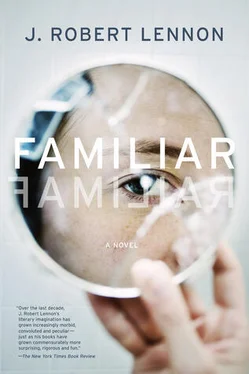Instead, she goes over to the red-haired girl in the long dress and says, “I owe you an apology.”
The girl blinks.
“I came to the house today and looked in the window. I’m afraid I may have embarrassed you.”
The girl looks frankly at her, taking in her clothes and shoes and face. She says, “You’re their mother.” Her voice is surprisingly low.
“Yes.”
The girl shifts her insignificant weight from one foot to the other and her dress moves against her body. It’s obvious that the dress is all she’s wearing. It’s so large and hangs down so far that the upper edge of an aureole is visible at the neckline. Her nipples show through the thin fabric and Elisa feels cold looking at her, though the room is warm.
Elisa hears more people entering behind her — a small crowd in fact. She smells cigarette smoke and hears bottles clanking together inside a paper bag. And then she realizes that she has seen this girl before. The perfect round arcs of the eyebrows are the same, and the oval chin. The oversized, not big, nose.
“You’re the girl from the game,” she says.
“What?”
“From Mindcrime. Silas’s game. You’re the waitress at the diner.”
The girl appears confused for a moment; her eyes film over. Then she seems to remember, and just as suddenly to lose the thread again. Elisa feels bad for bringing it up. The waitress in the game was voluptuous, full-hipped and large-breasted, radiant with health. Whereas this girl is sick. Did she ever look like the waitress? She blinks, again meets Elisa’s gaze.
“What do you do?” the girl asks.
“I work at a lab,” she replies, then corrects: “A college, I mean.” But the girl isn’t listening.
“No. What do you do? ”
“I don’t understand.”
The girl licks her chapped lips. The lip-licking continues. She’s smiling, a strange distracted smile that could be left over from some other conversation. The teeth are small and sharp with tiny spaces in between them, and a hard look has come over her face, a desire to inflict hurt.
“When you’re not at your lab. At a college. ”
After a moment Elisa says what she fantasized saying moments before, she says, “I paint.”
The girl says, “Waterfalls? Horses?”
“Abstracts.” But she doesn’t, of course. This Elisa doesn’t. Her studio is an office now — Derek’s office.
“Abstracts,” the girl says.
“That’s right.”
“Do they match your shoes?”
There’s a tug on her arm. It’s Sam, rescuing her from the conversation. The girl looks at the floor and Elisa mutters goodbye. She is introduced to some new people, none of whom she notices. Suddenly she wants that drink. She detaches herself from her son and goes to the kitchen. Silas isn’t there. It’s small and dirtier than it appeared through the window, the stove burners lined with aluminum foil in which grease is pooling around bits of burned food. At least they’re cooking, she thinks, that’s a good sign. A bottle of bourbon is standing on the counter, and she helps herself to some, using a cracked tumbler from the drying rack. There’s a jar beside it, a mason jar filled with some brown liquid that seems to be slowly swirling and glittering, and she stands there a moment, sipping the bourbon, trying to figure out what the jar contains.
Silas walks in from another room, running his hand through his hair. “Oh,” he says, “that’s right. Your drink.” He brushes his hands together, as though he’s just finished sawing some boards, and leans against the stove, arms crossed.
Elisa’s heart is galloping. She takes a deep draught from her glass and says, “Silas, what is wrong with that girl?”
“What girl.”
“The red-haired girl. The waitress from the game.”
His eyebrows rise infinitesimally, but his expression remains otherwise unchanged. “Rachel? She has problems.”
“She needs help.”
“Going to unleash those crack mothering skills?” he says. “Worm your way into her heart? With all of your kindness and charm? All your experience helping people?”
She can’t speak. He goes on.
“What with your life devoted to thinking about things besides yourself and your petty desires.”
“You should talk,” she says.
“I don’t pretend it’s any of my business. That girl is fucked up and she is dealing with it. It isn’t my fault. Not everything is my fault. This will come as a surprise to you, Lisa. I’m not to blame for everything. Some stuff is even your fault.”
She feels it, the old helplessness. The feeling that she has run, suddenly, unexpectedly, out of options. This was the signature emotion of her years as a parent of small children, the feeling that at any moment the mother in her might simply expire, leaving her alone, in some private world of failure, with the parts of herself she had abandoned. There must have been some signal she gave off, some stale odor or subtle corporeal slump, that telegraphed this emotion, because Silas always seemed poised to exploit it, to see what he could accomplish inside the space it created: the time he learned the word bitch, and all day he said bitch, because he had heard her refer to another woman this way, and knew she disliked this woman, and knew the word would do something to her, would make her react. And so she didn’t react, not at first. She turned the other cheek, like the pediatrician told them, like the child psychologist told them, like the piles of parenting and self-help books told them, she turned and walked out of the room.
But walking away was a reaction, ignoring was a reaction. It meant a real reaction was forthcoming. He followed her around all day, saying the word, until finally, the day nearly endured, her head aching and throat tight, she went into Sam’s room to say goodnight, and Sam looked at her, his face quivering with uncertainty, and said, “…bitch?”
She slapped him, hard, across the cheek. And before he could react went into Silas’s room where Silas lay on his bed beneath a galaxy of glow-in-the-dark stars laughing, and she slapped him too, harder, twice.
Silas screamed — not cried — as though she were sawing off his leg. She could feel through her feet the boy’s body writhing in the bed as in an epileptic fit, and his head thumping against the wall beside it, something he had begun to do to drive them madder still (but there she goes, ascribing motivation to this strange act, when who could know, really, why Silas, or anyone for that matter, did anything?) — there were marks there, visible in the daytime, stains and depressions left by his sweaty head. And by now Sam was crying too, and Derek’s feet thundered on the stairs and she felt herself being pulled out of the dark August-hot bedroom, away from the stink of boyhood and the wailing and the thumping of Silas’s head against the wall.
Derek led her down the stairs. He laid her on the sofa, pushed her down, held her arms down at her sides. “Stop it, stop it,” she was telling him but he wouldn’t let go, and soon she was struggling, like Silas, thrashing her own head, trying to knee him in the back.
Eventually she gave in. He wasn’t going to let go unless she gave in. So she lay still listening to the children cry and she said, “I need to apologize to Sam.”
“What happened?” Derek said, and she could not stand the fucking sound of his fucking patronizing holier-than-thou voice, as though she was the only irrational person in the house. Fuck you, Derek, she thought, fuck you for eternity.
“ Sam called me a bitch and I slapped him.” Not true, a voice told her, he had said the word, he hadn’t called her anything. He had said the word and she had assigned the intent. But she did not correct her story.
Читать дальше












